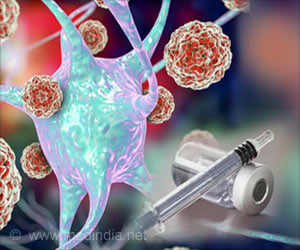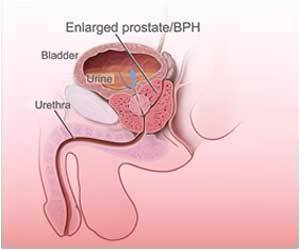A new target receptor identified for cancer immunotherapy which is expressed in a large number of cancer types but not in normal cells.
- A research team from Massachusetts General Hospital has found that inhibition of tumor necrosis factor receptor 2 stimulates the immune system of the host.
- The inhibition aids in increasing immune response and is also found to kill tumor cells
- The antibodies against tumor necrosis factor could be used in people with different types of cancer
Tumor Necrosis Factor 2:
TNF2 is known to possess these characteristics:- There is no death domain expressed on the receptor
- It induces a NF-kB activation that is long lasting
- TNFR2 activation of NF-kB is independent of the TNFR1 signaling
- TNFR2 is activated by tumor necrosis factor (TNF)
- TNFR2 is expressed on T cells that are immuno-suppressive as well as on many types of cancer cells.
Antibiotic Treatment of Cancer:
The use of antibody as a therapy for cancer is effective in two ways- Targeting specific oncogenes: An example of this method of treatment occurs in breast cancer where the expression of Her2 oncogenes on the surface of the tumor cells is effective in blocking the growth signal using antibody therapy. However, not everyone expresses these oncogenes.
- Targeting patient’s immune system: Current approaches involve targeting the immune system of the host, rather than just specific oncogenes that are expressed.
Immune Checkpoint Inhibitor Antibodies
There are certain inhibitors for the immune system which include molecules like PD1 and CTLA4 receptors which could aid in the treatment of cancer cells. The only drawback is that these are expressed both on normal cells as well as cancerous cells. Targeting these inhibitors could lead to the development of an autoimmune condition.Dr. Faustman and colleagues developed two new antibodies to TNFR2 which target an oncogene that is widely expressed and ready for killing cancer cells. When cells that express TNFR2 are selectively targeted, they restore the patient’s immune system which leads to renewed attack of the tumor cells.
Monoclonal Antibodies:
TNFR2 activation was inhibited by the research team by using antagonistic monoclonal antibodies which block the effects of the receptor rather than stimulating its activation. The studies found that- Antibodies inhibited the proliferation of regulatory T cells (Tregs)
- This allowed the restoration of immune system of the host
- TNFR2 antibodies killed Tregs more potently
- Tregs were isolated from the fluid that surrounds the ovarian cancer metastases than Tregs from cancer-free individuals
Two Birds with One Stone:
The blockage of the TNFR2 was found to boost the immune response against the tumor cells as well as kill the cells.TNFR2 in Tumor cells
In a study conducted by Yan F et al and colleagues titled “Expression of TNFR2 by regulatory T cells in peripheral blood is correlated with clinical pathology of lung cancer patients” and published in the journal Cancer Immunology Immunotherapy, the role of TNFR2 in tumor progression was detailed.- The peripheral blood of lung cancer patients showed higher expression of TNFR2.
- The expression of TNFR2 was correlated better than CD25(+) and CD127(-).
- Peripheral blood TNFR2(+) Tregs in the lung cancer patients was found to more proliferative and expressed higher levels of the immunosuppressive molecule, CTLA-4.
- Increased expression of TNFR2 on Tregs was associated with metastasis to distant target organs, lymphatic invasion, and a more advanced stage of lung cancer.
References:
- Expression of TNFR2 by regulatory T cells in peripheral blood is correlated with clinical pathology of lung cancer patients - (https://www.ncbi.nlm.nih.gov/pubmed/26280204)
















